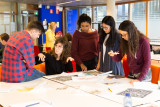Build your knowledge & skills on the Living Lab approach during the online AMS Summer School 2020. This year's Summer School focuses on challenges brought forward by Amsterdam: Quay Walls and Bridges, Future Proof Assets and Positive energy Districts.
The challenges facing cities around the globe are complex and multidisciplinary by nature. Attempting to solve them in conventional linear ways is insufficient for addressing these manifold human-environment relationships that are at the heart of these challenges. Alternative approaches are necessary; ones that acknowledge the need for distributed problem-solving capacity and infrastructures for multi-stakeholder collaboration that incorporate local knowledge and practices.
AMS Institute is leading the way to develop, test, use, and train on Living Lab approaches. One of the forms in which to transfer knowledge and experience is in our Summer School.
This year we, focus on challenges brought forward by Amsterdam: Quay Walls and Bridges, Future Proof Assets and Positive energy Districts.
What are Urban Living Labs?
Urban Living Labs are environments for different stakeholders to explore and experiment together on solutions for complex urban challenges. The goal within Living Labs is to make impact by developing new products on a small scale – be it an object, a service, a technology, an application, or a system – and to find solutions that can be implemented on a larger scale. This is done in a real-life and co-creating setting in which different stakeholders give shape to the innovation process. The actors are users, private and public actors, as well as knowledge institutes. In essence, it is a methodology to help the collaboration and the structuring the content of an explorative process.
What you will get
You will learn to understand what a Living Lab is and when it can be of added value to start one. You’ll also gain hand-on knowledge on what is needed to have a successful start, and how to deal with issues such as stakeholder involvement and citizen empowerment.
The summer school will challenge you to work with a new mindset, build a new network of professionals and academia. It gives you the opportunity to be a part of the next steps towards the future of one of Amsterdam’s key projects.
During the summer school, we will help you solve the real-world challenge you bring with your team.
What we will do During the week you will work in a team of 5 participants on a pre-defined real-life case. The Urban Living Lab Summer School consists of lectures, online co-working sessions, trainings, and real-world interventions. It will tap into theoretical frameworks of Living Lab methodology, process tools to help deliver a plan of approach and deploy teamwork on a real-life case. It will focus on your own learning goals for reinventing cities of tomorrow. The mix of participants (Academic Researchers, Public Professionals, and Company Innovation Managers) generates new insights and perspectives on the challenges by cocreating solutions together.
Requirements for participation
As a participant,
- you are a professional with minimal five years of experience in the field of urban challenges;
- or you are involved as a PhD or Postdoc in urban challenged research projects
- you identify with themes like urban circularity, mobility, energy, food systems, climate resilience and digitization;
- you strive for sustainable, innovative and just solutions;
- you are looking for different ways to tackle urban challenges;
- you are inclined to learn, collaborate and co-create from different perspectives.
Challenges: Quay Walls and Bridges, Future Proof Assets and Positive energy Districts
Target Group: Academic Researchers, Public Professionals, and Company Innovation Managers
Form: lectures, interactive online sessions with personal learning goals and team challenges.
Language: English
When: 17-21 August 2020
Where: Online
Costs:
PHD regular price €500; 2020 edition special price €300
PROFESSIONALS* regular price €2000; 2020 edition special price €1500
TEAMS please contact us for a special package deal
* AMS Institute partners please contact us for our partner prizes.
Application
The application deadline is July 20th 2020. The application should include full name, email address, cell phone number, organization/university- faculty, function, CV. The application must include a motivation letter. Send the application to events@ams-institute.org





